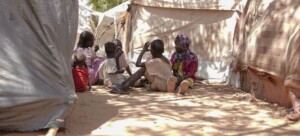Sudan’s oncology services in crisis
Sudan’s oncology services are in crisis. The Sudanese Ministry of Health reported a steady rise in cancer cases in addition to significant increases in treatment costs, whilst lack of medical equipment, clinics, and soaring transport costs mean that not everyone is getting the treatment they deserve.
 Health staff inspects medical supplies from Sudan’s National Medical Supplies Fund (Will Seal/UNDP Sudan)
Health staff inspects medical supplies from Sudan’s National Medical Supplies Fund (Will Seal/UNDP Sudan)
Sudan’s oncology services are in crisis. The Sudanese Ministry of Health reported a steady rise in cancer cases in addition to significant increases in treatment costs, whilst lack of medical equipment, clinics, and soaring transport costs mean that not everyone is getting the treatment they deserve.
In a meeting of Sudanese oncology specialists Khartoum on Wednesday, representatives of the federal Health Ministry said that the many challenges include the lack of a population-based registry for cancer, which affects treatment plans and the equitable distribution of services.
Frequent disruption of radiotherapy equipment poses another significant challenge and so do limited finances.
The Director of the National Oncology Centre, Abdallah Dafallah, said that there are patients who do not receive treatment, even though it is free of charge, because of the high transportation costs to the treatment centres.
He also drew attention to the disruptions in the import of medicines over the past years.
Dafallah also complained about “the absence of treatment possibilities for ordinary people in health institutions of the armed forces and the private sector” and called for partnerships and expansion of oncology centres in the states.
The absence of separate centres for children is another problem “as they need specialised care”.
Dafallah further noted that the current number of radiation devices, five in total, all in Khartoum, is far from enough. At least 40 radiation machines for beam therapy are needed in the country, he said.
The increase in the number of cancer patients has been a problem in Sudan for at least a decade.
Cancer increases?
The reasons why the number of cancer patients is increasing in Sudan are not completely clear. Toxic mining practices, using cyanide, are one of the reasons mentioned by Sudanese.
In 2014, Dabanga reported an unusually high rate of cancer cases in the area of Wadi Halfa, near the Sudanese-Egyptian border.
A resident from the area attributed the problem to the use of cyanide by gold exploration companies in northern Sudan.
“Cyanide spreads through the air, and can reach places over a distance of 150km. This has caused the large increase of cancer cases, and the pollution of the water and the air, with the result that birds are dropping dead, and large numbers of dead fishes are now floating on the Nile,” he said.
A year later, people in Wadi Halfa reported the mass death of fish in Lake Nasser.
Pesticide use in farming is another potential factor. In 2015, the Farmers’ Association of El Gezira and El Managel wanted to stop the increase in cancer cases amongst farmers suspected to be caused by certain pesticides and the way the chemicals are stored and transported.
The non-governmental Food and Nutrition Organisation told Radio Dabanga in 2014 that the use of outdated pesticides in El Gezira's agricultural schemes contaminated the crops. This caused nearly 93,000 people to develop allergies, kidney diseases and failure, as well as various forms of cancer, in the period between 2008 and 2010.











 and then
and then